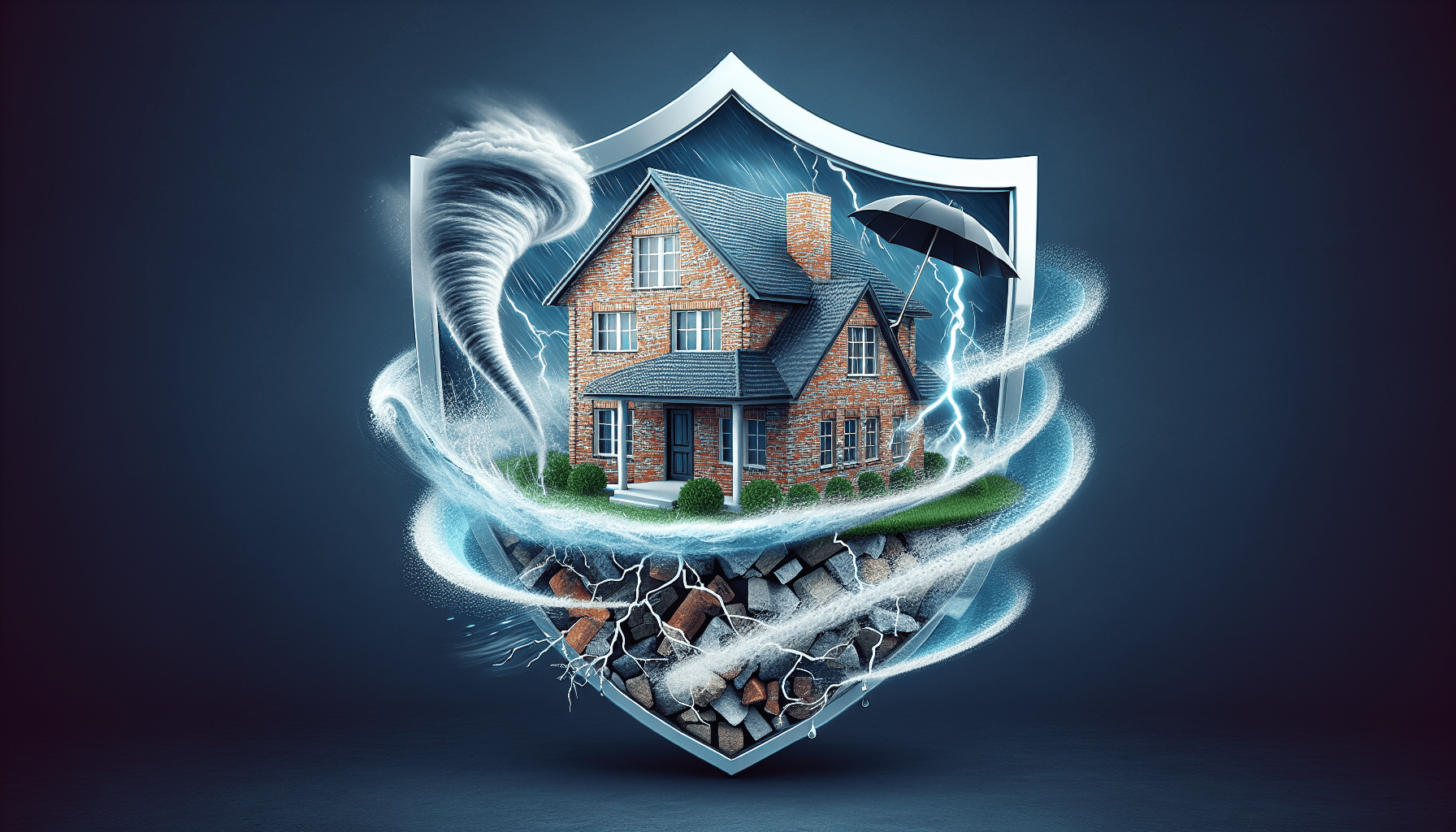When it comes to protecting your home from the unexpected, homeowners insurance plays a vital role. From natural disasters like hurricanes and earthquakes to unforeseen events such as theft and fire, homeowners insurance provides you with financial support and peace of mind. This article will delve into the importance of homeowners insurance coverage and the claim processes involved, ensuring that you understand how this crucial protection safeguards your most valuable asset – your home.

This image is property of images.pexels.com.
Understanding Homeowners Insurance
What is homeowners insurance?
Homeowners insurance is a type of insurance policy that provides financial protection to homeowners in the event of damage or loss to their property. It is designed to help homeowners recover financially from unexpected events such as natural disasters or unforeseen events that may cause damage to their homes.
Why is it important?
Homeowners insurance plays a crucial role in protecting one of your most valuable assets – your home. It provides you with peace of mind that you will be financially protected in case of any unforeseen events or natural disasters that may damage or destroy your property. Without homeowners insurance, you would be solely responsible for the costs of repairing or rebuilding your home, which can be financially devastating.
What does it cover?
Homeowners insurance typically covers four main areas: dwelling coverage, personal property coverage, liability coverage, and additional living expenses coverage.
Dwelling coverage protects the structure of your home and any attached structures, such as a garage or porch, from damage caused by covered perils. Personal property coverage provides reimbursement for the loss or damage of your personal belongings, such as furniture, appliances, and electronics, due to covered events. Liability coverage protects you financially if someone is injured on your property and takes legal action against you. Lastly, additional living expenses coverage helps cover the costs of temporary accommodation and other expenses if your home becomes uninhabitable due to a covered event.
Protection Against Natural Disasters
Coverage for natural disasters
Homeowners insurance typically provides coverage for a wide range of natural disasters, including but not limited to hurricanes, tornadoes, earthquakes, wildfires, and floods. However, it’s important to note that coverage for certain natural disasters may vary depending on your location and the specific policy you have.
Common natural disasters covered
Some common natural disasters covered by homeowners insurance include wind damage, hail damage, fire damage, and water damage caused by burst pipes or accidental leaks.
Exclusions and limitations
While homeowners insurance generally covers natural disasters, it’s important to understand that there may be exclusions and limitations in your policy. For example, flood damage is typically not covered by standard homeowners insurance and requires a separate flood insurance policy. Additionally, coverage for earthquakes may be excluded, but you may have the option to add it as an endorsement to your policy.

This image is property of images.pexels.com.
Protection Against Unforeseen Events
Coverage for unforeseen events
Homeowners insurance also protects you against unforeseen events that may cause damage to your home or property. This can include events such as vandalism, theft, or damage caused by falling objects like trees.
Examples of unforeseen events covered
Examples of unforeseen events covered by homeowners insurance include break-ins, theft of personal belongings, damage caused by vandalism, and damage caused by falling objects.
Exclusions and limitations
Similar to coverage for natural disasters, there may be exclusions and limitations in your homeowners insurance policy for unforeseen events. For example, some policies may have limitations on coverage for high-value items such as jewelry or artwork. It’s important to review your policy carefully and consider adding additional coverage or endorsements if needed.
Understanding Coverage Limits
What are coverage limits?
Coverage limits refer to the maximum amount that your homeowners insurance policy will pay out for covered losses. It is important to have an understanding of your policy’s coverage limits to ensure that you have adequate protection in the event of a loss.
Types of coverage limits
There are typically two types of coverage limits in homeowners insurance: dwelling coverage limits and personal property coverage limits. Dwelling coverage limits determine the maximum amount that will be paid out for damage to the structure of your home, while personal property coverage limits determine the maximum amount that will be paid out for damage to your personal belongings.
Factors to consider when determining coverage limits
When determining your coverage limits, it is important to consider factors such as the cost to rebuild your home, the value of your personal belongings, and any additional coverage needs you may have. It’s a good idea to work with your insurance agent to accurately assess your coverage needs and determine appropriate coverage limits.

This image is property of images.pexels.com.
Understanding Deductibles
What is a deductible?
A deductible is the amount of money that you, as the homeowner, are responsible for paying out of pocket before your insurance coverage kicks in. It is a predetermined amount that you choose when purchasing your homeowners insurance policy.
Types of deductibles
There are typically two types of deductibles in homeowners insurance: a dollar-amount deductible and a percentage deductible. A dollar-amount deductible is a fixed amount that you must pay in the event of a claim, while a percentage deductible is calculated based on a percentage of your total coverage limit.
Factors to consider when choosing a deductible
When choosing a deductible, it’s important to consider your financial situation and your ability to pay the deductible amount. A higher deductible will typically result in a lower premium, but you should ensure that you can comfortably afford the deductible in case of a claim. It’s a good idea to weigh the potential savings on your premium against the potential out-of-pocket expense of a higher deductible.
Filing a Claim
How to file a claim
When you experience a covered loss, it’s important to file a claim with your homeowners insurance company as soon as possible. Most insurance companies have a claims department or a specific claims phone number that you can call to start the claims process. You will need to provide detailed information about the loss, including the date and cause of the damage.
Documentation required
To support your claim, it’s important to gather and provide relevant documentation. This can include photographs or videos of the damage, receipts or proof of purchase for damaged or stolen items, and any other supporting documents requested by your insurance company. It’s a good idea to keep a thorough record of your belongings and their values to make the claims process smoother.
Claim process and timelines
Once you have filed a claim, your insurance company will assign a claims adjuster to assess the damage and determine the amount that will be paid out. The timeline for processing and settling a claim can vary depending on the complexity of the loss and the insurance company. It’s important to stay in touch with your claims adjuster and provide any requested information promptly to ensure a timely resolution.
Claim Denials and Disputes
Common reasons for claim denials
While homeowners insurance is designed to provide financial protection, there may be instances where a claim is denied by the insurance company. Common reasons for claim denials include policy exclusions, failure to meet coverage requirements, and misrepresentation of facts or intentional damage.
Appealing a denied claim
If your claim is denied, you have the right to appeal the decision. Review your denial letter carefully and gather any additional documentation or evidence that supports your claim. Contact your insurance company to initiate the appeals process and provide them with any new information or arguments that you believe justify overturning the denial.
Resolution options for claim disputes
If you are unable to resolve a dispute with your insurance company through the appeals process, there are alternative options available. This may include mediation, arbitration, or filing a complaint with your state’s insurance regulatory agency. It’s a good idea to consult with a lawyer or seek professional advice if you find yourself in a claim dispute with your insurance company.
Additional Coverage Options
Optional coverages for natural disasters
In addition to the standard coverage provided by homeowners insurance, there may be optional coverages available specifically designed to protect against certain natural disasters. For example, if you live in an area prone to earthquakes, you may be able to add earthquake coverage to your policy.
Additional coverages for specific hazards
Homeowners insurance may also offer additional coverages for specific hazards or risks. This can include coverage for sewer or water backup, identity theft, or equipment breakdown. It’s a good idea to review your policy and discuss any additional coverage options with your insurance agent to ensure that you have the appropriate protection for your needs.
Costs and benefits of additional coverage
When considering additional coverage options, it’s important to weigh the costs against the benefits. Additional coverage options may come with an additional premium, but they can provide valuable protection and peace of mind in case of a loss. Discussing the costs and benefits with your insurance agent can help you make an informed decision about what additional coverage options are worth considering.
Tips for Choosing the Right Policy
Assessing your needs and risks
When choosing a homeowners insurance policy, it’s important to assess your specific needs and risks. Consider factors such as the location and value of your home, the potential risks in your area, and your personal belongings. This will help you determine the types and amounts of coverage you need to adequately protect your home and belongings.
Comparing policy options
It’s a good idea to compare policy options from different insurance companies to ensure that you are getting the best coverage at the most competitive price. Consider factors such as coverage limits, deductibles, additional coverages, and customer reviews. Working with an independent insurance agent can help you navigate the options and find the policy that best meets your needs.
Working with an insurance agent
An insurance agent can be a valuable resource when it comes to choosing the right homeowners insurance policy. They can help assess your needs, explain policy options, and provide guidance throughout the process. An agent can also assist with claims and answer any questions you may have about your coverage or policy changes.
Maintaining Homeowners Insurance
Renewing your policy
Homeowners insurance policies typically have a term of one year, after which they need to be renewed. It’s important to review your policy and coverage annually to ensure that it still meets your needs. Renewing your policy promptly and communicating any changes to your insurance company will help ensure uninterrupted coverage.
Updating coverage as needed
Life circumstances and changes to your home may require updates to your homeowners insurance coverage. For example, if you make improvements or additions to your home, it’s important to update your policy to reflect the changes. Additionally, if you acquire valuable items such as jewelry or artwork, you may need to add additional coverage to protect them adequately.
Reviewing and understanding policy changes
Insurance policies may undergo changes, updates, or revisions over time. It’s important to review any policy changes and updates that are provided by your insurance company. Take the time to read and understand the changes, and contact your insurance agent if you have any questions or concerns. Staying informed about your policy will help ensure that you have the right coverage in place when you need it.
In conclusion, homeowners insurance is a vital aspect of protecting your home and financial well-being. It provides coverage for natural disasters and unforeseen events, allowing you to recover financially from unexpected losses. Understanding your coverage limits, deductibles, and the claims process is essential for making informed decisions and optimizing your policy. By assessing your needs, comparing policy options, and working with an insurance agent, you can choose the right homeowners insurance policy to meet your specific needs. Regularly reviewing and maintaining your policy will ensure that you have adequate coverage as your circumstances change.



